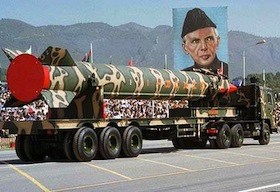Pakistan: World's Fastest Growing Nuclear Arsenal
July 5, 2011
Featured Image
Today's top nuclear policy stories, with excerpts in bullet form.
Stories we're following today: Tuesday, July 5, 2011.
Nuclear Notebook: Pakistan's nuclear forces, 2011 - Hans M. Kristensen and Robert S. Norris in the Bulletin of the Atomic Scientists [link]
- The US raid that killed Osama bin Laden has raised concerns about the security of Pakistan's nuclear arsenal … Despite its political instability, Pakistan continues to steadily expand its nuclear capabilities and competencies; in fact, it has the world's fastest-growing nuclear stockpile.
- We estimate that Pakistan has a nuclear weapons stockpile of 90–110 nuclear warheads … [and] the rate of Pakistan's stockpile growth may even increase over the next 10 years.
- The full contents of this article are available in the July/August issue of the Bulletin of the Atomic Scientists and can be found here.
Original Nuclear Weapons States Need to Walk the Walk and Fulfill Their NPT Disarmament and Nonproliferation Commitments - Daryl G. Kimball and Peter Crail in Arms Control Now [link]
- [Last] week’s meeting of senior officials from the five original nuclear weapon states (the United States, Russia, the United Kingdom, France, and China) in Paris for the second meeting on nuclear weapons policy issues is a potentially important step toward multilateralizing the nuclear disarmament enterprise. Their joint press statement [was] released [last week].
- Both [Russia and the United States] still need to lead on deeper nuclear reductions … [and] could reduce their overall nuclear stockpiles substantially—to 1,000 warheads.
- The P5 statement calls for the “swift entry into force” of the Comprehensive Test Ban Treaty (CTBT) … It is important that the P5 governments and others back up their words with action.
Eliminating the Nuclear Evil - Desmond Tutu in Pacific Free Press [link]
- ... all [nuclear weapons states] are squandering billions of dollars on modernization of their nuclear forces … If we allow this madness to continue, the eventual use of these instruments of terror seems all but inevitable.
- The unspeakable human suffering that [nuclear weapons] inflict is the same whatever flag they may bear. So long as these weapons exist, the threat of their use – either by accident or through an act of sheer madness – will remain.
- Every dollar invested in bolstering a country’s nuclear arsenal is a diversion of resources from its schools, hospitals, and other social services ... Instead of investing in weapons of mass annihilation, governments must allocate resources towards meeting human needs.
- The only obstacle we face in abolishing nuclear weapons is a lack of political will, which can – and must – be overcome.
Russia’s Foreign Minister Says Libya, Missile Defense Issues Hinder NATO-Russia Cooperation - Associated Press [link]
- “The dialogue is not proceeding as easily as we expected after the Lisbon summit,” Sergey Lavrov said, referring to the meeting of Russia’s and NATO’s heads of state in the Portuguese capital in November, when the former Cold War rivals decided to forge a close partnership.
- “Many key issues need to be addressed. We never said we would agree on ballistic missile defense in a few weeks or months,” Fogh Rasmussen said. “But we are determined to keep up the dialogue.”
- Russia is demanding to jointly run the system, while the United States and NATO are offering Moscow a more limited role. Experts from both sides are scheduled to report this month on details of the proposal.
More on the House Cut to the Global Threat Reduction Initiative - Kingston Reif in Nukes of Hazard [link]
- Given the low budget ceiling it was given to work with, the Committee did it’s best to protect vital nuclear material removal and nonproliferation efforts. However, the FY 2012 bill cuts $70 million (nearly 50% of the request) from the Global Threat Reduction Initiative’s Highly Enriched Uranium (HEU) Reactor Conversion program and $50 million from domestic radiological protection activities.
- The Highly Enriched Uranium Reactor Conversion program supports the conversion of domestic and international research reactors and medical isotope production facilities that use HEU to low enriched uranium (LEU). Dozens of reactors worldwide are still powered by HEU, many of which are not adequately secured.
- The Highly Enriched Uranium Reactor Conversion program is a critical threat reduction activity to reduce the threats of nuclear terrorism. Underfunding this program, which the House has now done for two years in a row, undermines U.S. national security.



